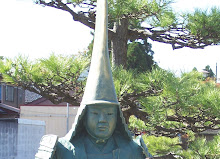Haafu is a Japanese japlish word that meas a person who is half Japanese and half non-Japanese. Normally the child of an international marriage.
Corey Gaskins wrote about his life and this issue in Metropolis Magazine. He begins:
“I am Japanese. In fact, I had been Japanese for 21 years before coming to Tokyo to live for the first time in 2006. You might not consider that very Japanese, but I think I’ve passed all the tests.”
I can tell him one thing: nobody in Tokyo, Japan will think he's Japanese. Just as I don’t think that people in Uganda think that a black man from Florida is really African.
“For instance, when I was 10 and living in Portugal, I endured hordes of people shouting ‘Hey Chinese boy! What are you doing?’”
These people were clearly ignorant, but their ignorance doesn’t make him Japanese. Being Japanese means that you’re part of a tribe of "mind and blood.” That’s the best way I can put it. You may have Japanese blood, but if you weren’t raised in Japan – and learned the way to be and think like Japanese people – you aren’t Japanese. Again, one can label this Japanese racism, but I think this would be a mistake. The writer continues:
"I expected that when I moved to Tokyo, I would finally be able to blend into Japanese society. How naïve I was!”
Yes. It’s true. Many Japanese-Americans who thought of themselves as “Japanese,” have received a great shock when they went to Japan to work or live. I have sympathy for the disappointment he must have felt in Japan, he goes on:
“Some people, namely celebrities, do capitalize on their biracial origins, wearing the ‘We’re different’ sash proudly. But that’s not me. I don’t get paid for how I look or how much I stick out in a crowd. When I moved to Japan, I was simply a recent college graduate struggling to fit in.”
The first problem, again, was trying to “fit in.” This can’t be done. Japan is not an open, pluralistic society; traditional Japanese culture has never been pluralistic, and modern Japan has no intentions to go that route. And if we’re honest, we as foreigners in Japan must admit the attraction of Japan is precisely its “closed” homogeneous quality.
The second mistake was thinking that “being different” in Japanese culture was an admirable quality. In the West, with the notion of free will, human rights and individual liberty, “being different” is often respected. Not in Japanese culture! (unless you’re a wacky Japanese comedian, of course, but then being wacky is actually what’s expected of you).
The writer then talks about how in the West he felt like he couldn’t share his Asian roots with people. He writes:
“Just once in a while, I wished I knew somebody else who could understand how great it is to drink warm green tea after eating the undulated sweetness of azuki-filled mochi.”
The Japanese will drink Japanese green tea with you and eat Japanese mochi, but they’ll still will be amazed that you – a foreigner – like to drink green tea and eat mochi. You won’t be amazed, but they will. It’s reality.
Maybe the Japanese people should welcome the writer home as a “long lost brother,” but that would be fake. We in the West often accuse the Japanese of hiding their true feelings, but when they treated this man like a foreigner, they were being sincere.
“After the 1,000th time I was asked “Are you haafu?” and after repeating the same set of answers three or four times a day, I’d had enough. Not only that, I started feeling pangs of indignation when the locals seemed eager to point out how much I didn’t belong here — the very country I’d identified as my homeland since birth! I wondered how other haafu coped.”
In this disappointment, we must feel great empathy for the writer. Yet I don’t think it’s the fault of the Japanese. I believe the real fault are those in the West who make so much of the ethnic backgrounds of so-called “minorities.”
We go on and on (particularly in America) about how so and so is the “first Chinese-American elected to the so and so school board” and so on. Instead of letting Americans be Americans, we make them “special.” I suspect it was this endless multicultural dialogue in the West (along with real instances of racism as he suggests) that got this writer so convinced he was Japanese.
In the end, the writer found a kind of “haafu” community in Japan, which seems rather nice, yet aslo a little sad:
“Hanging out with half-Chinese, -Peruvians, -Greeks or -Palestinians, my race never became an issue — none of my new friends made a fuss when I was able to belt out a popular B’z song at karaoke. By befriending other haafu, I was able to be who I truly was, and not what my race was.”
The writer is fine man, who is sincere in his feelings and experiences. And in his honest telling of this experience as a haafu in Japan, we can learn quite a bit if we're listening.








No comments:
Post a Comment